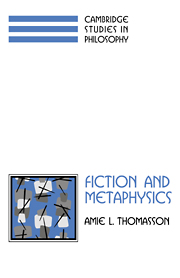Book contents
- Frontmatter
- Contents
- Acknowledgments
- Introduction: From Fiction Into Metaphysics
- Part One The Artifactual Theory of Fiction
- Part Two Ontological decisions
- Foreword
- 6 Fiction and experience
- 7 Fiction and language
- 8 Ontology and categorization
- 9 Perils of false parsimony
- 10 Ontology for a varied world
- Notes
- Bibliography
- Index
9 - Perils of false parsimony
Published online by Cambridge University Press: 23 September 2009
- Frontmatter
- Contents
- Acknowledgments
- Introduction: From Fiction Into Metaphysics
- Part One The Artifactual Theory of Fiction
- Part Two Ontological decisions
- Foreword
- 6 Fiction and experience
- 7 Fiction and language
- 8 Ontology and categorization
- 9 Perils of false parsimony
- 10 Ontology for a varied world
- Notes
- Bibliography
- Index
Summary
The lure of parsimony lies behind many ontological decisions. In this respect the case of fictional objects is not unique, for the desire for a thriftier ontology forms the most important motivation for rejecting fictional characters. As a result, a great deal of philosophical ingenuity is expended trying to analyze away apparent reference to fictional objects, to show how we can avoid having fictional objects “forced on” us by talking instead of works of literature or games of make-believe.
Despite the centrality of concerns of parsimony in shaping ontologies, claims to parsimony are often invoked without any analysis of the concept of ontological parsimony and without any attempt to distinguish genuine from false parsimony. But even in the literal use of the term “parsimony” to mean running a household economically, we all recognize (or learn to recognize) the difference between genuine parsimony and false parsimony. You do not run a more parsimonious household just by refusing to buy anything – what you need is an overall plan in terms of which you can see the long-range effects of your purchasing and try, in the long term, to get more for less.
Although the principles for parsimony of a philosophical theory are different from those of household parsimony, it is still important to distinguish genuine parsimony from false parsimony in philosophical theories. Just as we do not necessarily run a more parsimonious household by refusing to buy anything, simply eliminating entities wherever possible does not inevitably result in a more parsimonious ontology.
- Type
- Chapter
- Information
- Fiction and Metaphysics , pp. 137 - 145Publisher: Cambridge University PressPrint publication year: 1998



